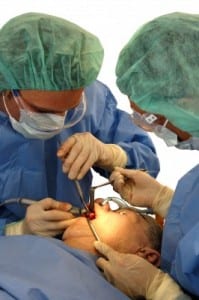 Cavities are holes that develop in the tooth surface. They are caused by tooth decay, one of the most common preventable illnesses among children and adults in the UK. If you have cavities or tooth pain, we urge you to get in touch with your dentist and make an appointment. Leaving cavities increases the risk of severe infection and may even lead to tooth loss.
Cavities are holes that develop in the tooth surface. They are caused by tooth decay, one of the most common preventable illnesses among children and adults in the UK. If you have cavities or tooth pain, we urge you to get in touch with your dentist and make an appointment. Leaving cavities increases the risk of severe infection and may even lead to tooth loss.
What causes tooth decay?
Tooth decay is caused by harmful bacteria that collect and multiply in the mouth. These bacteria release acids that attack and erode the tooth enamel, eventually wearing holes in the outer layer of the tooth. The most common risk factors for cavities are poor oral hygiene and a diet that contains a lot of sugary and acidic foods.
How can I tell if I have a cavity?
Sometimes it’s possible to feel or see a cavity. You may be able to see the hole in the surface of the tooth, especially if it has become discoloured. You might also feel it when you run your tongue over the surface of the tooth. Other signs of decay include increased sensitivity that manifests itself through pain when the teeth come into contact with hot and cold substances, toothache and a feeling of weakness when you use the tooth.
Why it’s important to treat cavities
If you have cavities, it’s important to get them sorted by your dentist. Once the enamel layer of the tooth has been penetrated, there is a risk of infection spreading through the tooth into the living tissue of the tooth, known as the pulp. It is possible for the pulp to become infected and this may result in severe damage or even loss of the tooth. In this case, it may be possible to save the tooth by means of performing root canal treatment. Decay can also increase the risk of dental abscesses, which are usually very painful.
As with all dental diseases, we believe that prevention is better than cure when it comes to tooth decay and we recommend a good daily oral hygiene routine, regular dental check-ups and steering clear of too many sugary treats!





 If you have ever suffered from a dry mouth in central Leeds, it can become very irritating- it makes you and your mouth feel uncomfortable: it can also mean your diet and general oral hygiene are pretty woeful. There are ways to counter the problem, but counter it you must at all costs because it can become deadly to not only your teeth and gums, but to the rest of you as well. Whatever the reasons, a dry mouth is an indication that the saliva levels in the mouth have dipped below what they should be and if the problem is not resolved, it can lead to some very complicated issues arising. Saliva is the natural way of fighting off plaque and removing acids that build up on the surface of the teeth. However, remove the saliva and the gums will dry out and the acids will start to make in-roads into the teeth. At this point, the teeth can be repaired with a filling, but cavities will form and if left unattended, can lead to even deeper cavities forming and causing deep decay in the tooth. A root canal will be required but you should be warned that something is out of control if it reaches this level- cavities can lead to gum disease; you will lose your teeth if you don’t take action, but worse still, such terrors will start to infect the blood in your body and then infiltrate the vital organs in your body….you have been warned!
If you have ever suffered from a dry mouth in central Leeds, it can become very irritating- it makes you and your mouth feel uncomfortable: it can also mean your diet and general oral hygiene are pretty woeful. There are ways to counter the problem, but counter it you must at all costs because it can become deadly to not only your teeth and gums, but to the rest of you as well. Whatever the reasons, a dry mouth is an indication that the saliva levels in the mouth have dipped below what they should be and if the problem is not resolved, it can lead to some very complicated issues arising. Saliva is the natural way of fighting off plaque and removing acids that build up on the surface of the teeth. However, remove the saliva and the gums will dry out and the acids will start to make in-roads into the teeth. At this point, the teeth can be repaired with a filling, but cavities will form and if left unattended, can lead to even deeper cavities forming and causing deep decay in the tooth. A root canal will be required but you should be warned that something is out of control if it reaches this level- cavities can lead to gum disease; you will lose your teeth if you don’t take action, but worse still, such terrors will start to infect the blood in your body and then infiltrate the vital organs in your body….you have been warned! Are you experiencing toothache? Have you noticed any changes in the surface area of your teeth such as a hole or a pit? Then you may have a dental cavity and should see your dentist in the City of Leeds as soon as possible.
Are you experiencing toothache? Have you noticed any changes in the surface area of your teeth such as a hole or a pit? Then you may have a dental cavity and should see your dentist in the City of Leeds as soon as possible. Cavities can form in your teeth if you let your home oral hygiene routine slip and allow plaque to damage your enamel and create holes. It is vital that these holes are filled up so that the problem cannot carry on getting worse until you are left with a mere husk of a tooth that cannot function and might be best removed from the mouth all together.
Cavities can form in your teeth if you let your home oral hygiene routine slip and allow plaque to damage your enamel and create holes. It is vital that these holes are filled up so that the problem cannot carry on getting worse until you are left with a mere husk of a tooth that cannot function and might be best removed from the mouth all together. The good news is that metal fillings are no longer the only option for you if you are suffering from cavities in your teeth. These small holes can occur as the result of sustained attack from plaque that has broken down the protective layer of enamel on your teeth. It is important that they are filled so that your nerves are not able to be compromised and your teeth begin to decay fully.
The good news is that metal fillings are no longer the only option for you if you are suffering from cavities in your teeth. These small holes can occur as the result of sustained attack from plaque that has broken down the protective layer of enamel on your teeth. It is important that they are filled so that your nerves are not able to be compromised and your teeth begin to decay fully. You should make sure that you visit your dentist every six months to have your mouth checked by a professional, but the responsibility of looking after your teeth and gums does not only lie with your dentist. You ought to be taking good care of your teeth at home too, and making sure that you are cleaning them properly.
You should make sure that you visit your dentist every six months to have your mouth checked by a professional, but the responsibility of looking after your teeth and gums does not only lie with your dentist. You ought to be taking good care of your teeth at home too, and making sure that you are cleaning them properly. A very popular Leeds dentist spoke up about the way the average person neglects their teeth. Dental cavities are a case in point. They are also known as caries and they are one of the most common ailments that humans suffer from. What starts off as a very small cavity can deteriorate with neglect and result in a lot of problems for you. Not only will you experience a lot of discomfort, you will also end up paying a lot of money for expensive treatments that are expensive in addition to being painful.
A very popular Leeds dentist spoke up about the way the average person neglects their teeth. Dental cavities are a case in point. They are also known as caries and they are one of the most common ailments that humans suffer from. What starts off as a very small cavity can deteriorate with neglect and result in a lot of problems for you. Not only will you experience a lot of discomfort, you will also end up paying a lot of money for expensive treatments that are expensive in addition to being painful. Dental cavities and tooth decay don’t just affect adults. More and more children are becoming at risk from the threat of tooth decay because of the high levels of sugar they are eating and the developing nature of their teeth. Tooth decay now affects nearly a fifth of two to four year olds and more than half of eight year olds in the UK.
Dental cavities and tooth decay don’t just affect adults. More and more children are becoming at risk from the threat of tooth decay because of the high levels of sugar they are eating and the developing nature of their teeth. Tooth decay now affects nearly a fifth of two to four year olds and more than half of eight year olds in the UK. Tooth decay is caused by a build up of a filmy, sticky substance called plaque that coats the teeth and releases acid which erodes the protective enamel layer. This causes small holes called cavities to appear in the teeth allowing bacteria to penetrate to the sensitive inner area of the tooth. Inside the tooth is the dental nerve housed in a casing of a softer material called pulp. If bacteria gets into this part of the tooth it can cause an infection that will not only be painful but could result in the death and eventual loss of the tooth.
Tooth decay is caused by a build up of a filmy, sticky substance called plaque that coats the teeth and releases acid which erodes the protective enamel layer. This causes small holes called cavities to appear in the teeth allowing bacteria to penetrate to the sensitive inner area of the tooth. Inside the tooth is the dental nerve housed in a casing of a softer material called pulp. If bacteria gets into this part of the tooth it can cause an infection that will not only be painful but could result in the death and eventual loss of the tooth. Dental cavities are one of the most common health complaints in the UK every year. Millions of people each year need treatment for dental cavities of varying degrees of severity, but what exactly are cavities? What causes them and why do they require treatment?
Dental cavities are one of the most common health complaints in the UK every year. Millions of people each year need treatment for dental cavities of varying degrees of severity, but what exactly are cavities? What causes them and why do they require treatment?

